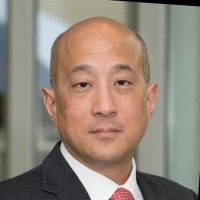Published May 2, 2023 | 3 min read
Key Points
- MSK initiated an ambitious effort to develop a comprehensive atlas of hallmark genetic changes, immune cell landscape and cancer-specific proteins in childhood and young adult sarcomas.
- A key challenge for patients is inadequate market incentives for commercial development of new treatments for rare pediatric cancers.
- But treatments developed for adult cancers have the potential to be “repurposed” for pediatric cancers that share the same drug target.
- Pediatric cancers are rare, so development of CAR T cell therapies for pediatric solid tumors has been nearly non-existent, spurring academic institutions to lead in developing these therapies.
This article was written by Dr. Andrew Kung, Chair of the Department of Pediatrics at Memorial Sloan Kettering Cancer Center (MSK). For over a decade, RBC has proudly supported the important work being done at MSK to fight children’s cancer.
In 2022, RBC partnered with MSK to create the RBC Initiative in Pediatric Immuno-Oncology, helping pioneer the use of immunotherapy to arrive at more effective, less toxic outcomes for children with cancer.
Finding targets for pediatric immunotherapy
At MSK, we initiated an ambitious effort to develop a comprehensive atlas of the hallmark genetic changes, immune cell landscape and cancer-specific proteins in childhood and young adult sarcomas.
This cross-disciplinary effort is driven by a working group of over twenty MSK faculty, and in the past year we have established feasibility of the endeavor by completing the analysis of over thirty Ewing sarcomas, rhabdomyosarcomas and epithelioid sarcomas, which represent some of the most refractory sarcomas that affect children and young adults. We have also established novel “big data” methods to integrate the large datasets and to identify targets for novel immunotherapies.
Our current work is focused on the prospective analysis of patients with refractory sarcomas and integration of multi-dimensional molecular profiling data. Ultimately, the goal is to generate a comprehensive molecular atlas of childhood and young adult sarcomas, which is expected to propel new laboratory and clinical research of sarcoma biology and innovative new treatments for these underserved cancers.
“Ultimately, the goal is to generate a comprehensive molecular atlas of childhood and young adult sarcomas, which is expected to propel new laboratory and clinical research of sarcoma biology and innovative new treatments for these underserved cancers.”
Dr. Andrew Kung, Chair of the Department of Pediatrics at Memorial Sloan Kettering (MSK)
Adapting adult treatments for kids
Because there is inadequate market incentive for developing new treatments specifically for rare pediatric cancers, we often leverage new treatments developed for adult cancers which have the potential to be “repurposed” for use with pediatric cancers that share the same drug target. Our pediatric cancer team continues to collaborate with our adult oncology colleagues as we work together to bring more of these new therapies to children.
Over the last year, we have expanded 10 new adult clinical trials to include pediatric patients. In total, across our portfolio of clinical trials, there are 54 adult oncology-based clinical trials that are now open to inclusion of pediatric patients.
Developing new immunotherapy drugs
Chimeric antigen receptor T cells (CAR T cells) enable a patient’s immune system to recognize and eliminate cancer. The first CAR T cell therapy was approved by the FDA in 2017 for the treatment of childhood acute lymphoblastic leukemia (ALL). Since that time, six additional CAR T cell therapies have been approved for adult and pediatric hematologic malignancies (blood cancers).
Although there are currently no CAR T cell therapies approved for any solid tumor indication, there are several clinical trials of novel CAR T cells for a variety of adult solid cancers. Because pediatric cancers are rare, the development of CAR T cell therapies for pediatric solid tumors has been nearly non-existent in the commercial market, spurring academic institutions to take the lead in developing these therapies.
“In total, across our portfolio of clinical trials, there are 54 adult oncology-based clinical trials that are now open to inclusion of pediatric patients.”
Dr. Andrew Kung, Chair of the Department of Pediatrics at Memorial Sloan Kettering (MSK)
At MSK, our world-class faculty and researchers are uniquely positioned to drive new CAR T cell therapies to the clinic for pediatric solid tumors for several key reasons. First, we can leverage the large number of CAR T cells developed within MSK for adult solid tumors to identify potential pediatric cancers for which these existing therapies might be “repurposed”.
Second, from our expansive genomics work, we have identified pediatric-specific targets for which we are leveraging existing MSK infrastructure and expertise to create CAR T cells specific for these pediatric cancers.
And third, as the largest pediatric cancer program in the nation, we have the clinical trials infrastructure in place to rapidly move novel CAR T cells into clinical trials. As a result, we have multiple mature CAR T cell therapies nearing readiness for clinical testing.
MSK will continue to pioneer advances for pediatric patients in the years ahead. Through clinical trial findings and laboratory studies, our increasing understanding of the role that genes, mutations and proteins play in pediatric cancer will help forge a new way forward to control and bring us one step closer to a cure for a greater number of children’s cancers.
Click here to learn more about how MSK is changing the way we fight childhood cancer.
